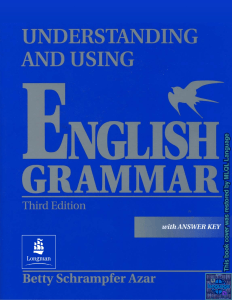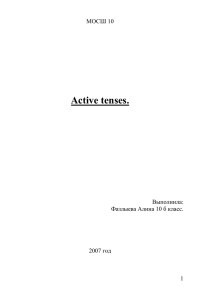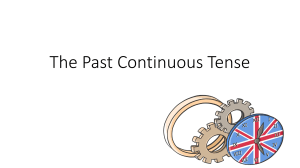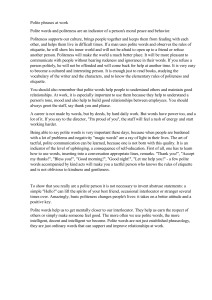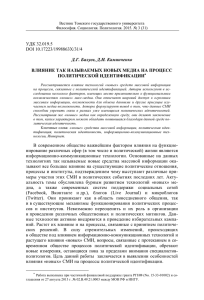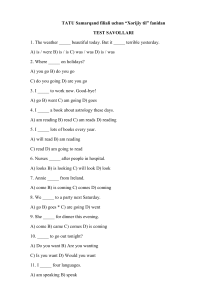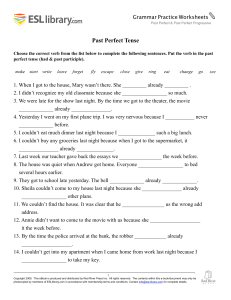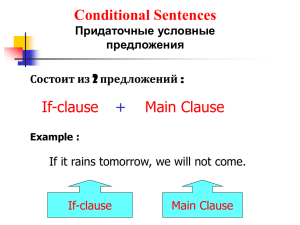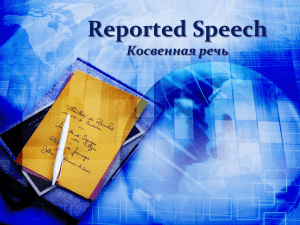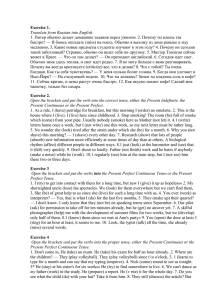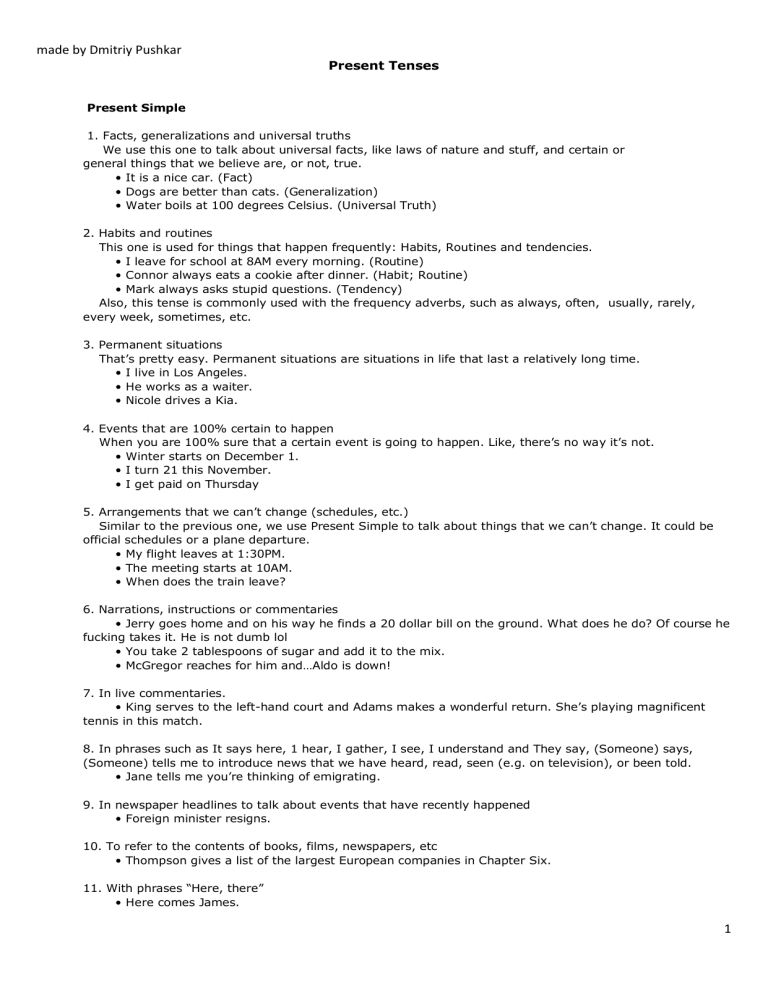
made by Dmitriy Pushkar Present Tenses Present Simple 1. Facts, generalizations and universal truths We use this one to talk about universal facts, like laws of nature and stuff, and certain or general things that we believe are, or not, true. • It is a nice car. (Fact) • Dogs are better than cats. (Generalization) • Water boils at 100 degrees Celsius. (Universal Truth) 2. Habits and routines This one is used for things that happen frequently: Habits, Routines and tendencies. • I leave for school at 8AM every morning. (Routine) • Connor always eats a cookie after dinner. (Habit; Routine) • Mark always asks stupid questions. (Tendency) Also, this tense is commonly used with the frequency adverbs, such as always, often, usually, rarely, every week, sometimes, etc. 3. Permanent situations That’s pretty easy. Permanent situations are situations in life that last a relatively long time. • I live in Los Angeles. • He works as a waiter. • Nicole drives a Kia. 4. Events that are 100% certain to happen When you are 100% sure that a certain event is going to happen. Like, there’s no way it’s not. • Winter starts on December 1. • I turn 21 this November. • I get paid on Thursday 5. Arrangements that we can’t change (schedules, etc.) Similar to the previous one, we use Present Simple to talk about things that we can’t change. It could be official schedules or a plane departure. • My flight leaves at 1:30PM. • The meeting starts at 10AM. • When does the train leave? 6. Narrations, instructions or commentaries • Jerry goes home and on his way he finds a 20 dollar bill on the ground. What does he do? Of course he fucking takes it. He is not dumb lol • You take 2 tablespoons of sugar and add it to the mix. • McGregor reaches for him and…Aldo is down! 7. In live commentaries. • King serves to the left-hand court and Adams makes a wonderful return. She’s playing magnificent tennis in this match. 8. In phrases such as It says here, 1 hear, I gather, I see, I understand and They say, (Someone) says, (Someone) tells me to introduce news that we have heard, read, seen (e.g. on television), or been told. • Jane tells me you’re thinking of emigrating. 9. In newspaper headlines to talk about events that have recently happened • Foreign minister resigns. 10. To refer to the contents of books, films, newspapers, etc • Thompson gives a list of the largest European companies in Chapter Six. 11. With phrases “Here, there” • Here comes James. 1 made by Dmitriy Pushkar 12. In instructions and directions • First, you cut the tomatoes and add them to the mixture. • Your turn left at the end of the road and the school is up ahead. 13. Telling jokes and other informal stories • So, a man goes to see his psychiatrist. 14. Reviews and summaries • The film ends with us not knowing whether they’ve been successful or not. Present Perfect 1. Actions which happened at an unknown time before now Use the Present Perfect to talk about stuff that happened at some point in the past. NEVER use it with time expressions like yesterday, last summer, a week ago, etc. • She has been to Russia. • Matthew has already done laundry. 2. Actions in the past which have an effect on the present moment • She has finished her homework. (so she is just chillin’) • I have already eaten. (so I’m not hungry right now) 3. Actions which began in the past and continue in the present Since and For are commonly used with the Present Perfect. We use For to indicate a period of time and when talking about a starting point, we use Since: • I have lived here for 3 years. • I have lived here since 2013. 4. For actions happened in the past and finished, but the results are obvious in the present • Tim has washed his car. (it’s clean) 5. To specify a particular number of times/things. • I’ve written two essays this week. Present Progressive 1. Present actions These are actions happening at the moment of speaking. • He is eating a burger. • They are doing homework. 2. Temporary actions This tense is also used for activities continuing only for a limited time period. • They are not talking with each other after the last argument. (Implying they will soon make up) • Daniel is working at Starbucks. (He is working there during the summer holidays) 3. Longer actions in progress You would use this one when you are in the middle of something time-consuming (something that takes time to complete). You could be writing a book, saving money or studying for a test. • I am working so hard to earn money. • Tyler is currently writing a musical. • I am training to become a fitness model. 4. Future arrangements and plans This one is also used to show something is planned and will be done in the near future. • I am meeting Jazmine next weekend. • Venya is flying back to Russia in July. • I’m not doing anything tonight. 2 made by Dmitriy Pushkar 5. Tendencies and trends Nothing else to explain here. Use this tense for expressing tendencies or trends. • The Internet is becoming really powerful. • Our country is getting richer. • Russian Ruble’s value is increasing again. 6. Irritation There is plenty of annoying people everywhere. Use this tense to express irritation or anger over somebody or something in the present with adverbs such as: always, continually or constantly. • Mark is always asking stupid questions! • Sammy is constantly saying stupid shit to everyone! • She is continually complaining about everything! 7. With stative verbs We can use the present continuous with some state verbs (e.g. attract, like, look, love, sound) when we want to emphasize that a situation is temporary or for a period of time around the present. • Jean’s with us at the moment. The children are loving having her here. 8. In live commentaries. • King serves to the left-hand court and Adams makes a wonderful return. She’s playing magnificent tennis in this match. 9. To describe something we regularly do at a certain time • At 8 o’clock I’m usually driving to work, so phone me on my mobile. 10. To describe situations which are changing around the present time • Air pollution is increasing in our city. 11. Polite questions If we want to ask someone a question, we often want to sound polite. We can use the Present Progressive here as well. • I’m just wondering if you can lend me some money. 12. Background information in jokes and other informal stories. • A man goes to see his psychiatrist. He’s carrying a bag full of money. Present Perfect Progressive 1. Actions that started in the past and continue in the present (emphasizing the duration) • I have been writing this lesson for 5 hours. (I’m still writing it) • Nick has been working out with me since January. (He still works out with me) 2. Actions that have recently stopped • I have been waiting for you for an hour! (I’m not waiting anymore because you’re here now) • Look at her eyes! I’m sure she has been crying. (She is not crying anymore, but you can tell she was) 3. Temporary actions and situations • I have been dieting for two months. • I have been working as a teacher for the past week. 4. To show annoyance resulting from a recent action • Who has been wearing my jacket? 5. For actions which happened over a period of time in the past and may have finished, but the results are obvious in the present • We’ve been walking around all day. Therefore we’re so tired. 3 made by Dmitriy Pushkar Past tenses Past Simple 1. Completed events that happened at a specific time in the past that are now finished (the time is mentioned or implied) • Nick worked out with me yesterday. • I went to school 5 years ago. 2. Permanent situation in the past • I lived in Russia for 17 years (implied I don’t live there anymore) 3. A list of actions in the past The Past Simple is also commonly used with a few actions in the past happening one after another. • She walked in, smiled at me and grabbed a drink. 4. Past habits or repeated actions in the past (often used with adverbs of frequency) • When I was younger, I often went jogging in the park. 5. An action in the past that interrupted a ‘longer’ action in progress • I was sleeping when the phone rang. 6. The main events in a story • Frank turned on the TV sat on the sofa. Past Progressive 1. Activities that lasted for some time in the past We use the Past Continuous to talk about actions or situations that lasted for some time in the past, and whose duration times are unknown or irrelevant. • I was working out • He was sleeping in the bathtub 2. Interrupted actions in progress The Past Continuous is often used when one action is interrupted by another action in the past. The Past Simple is used in that case with when or while to link these two sentences. • I was working out when my wife called me. • While/When Matthew was sleeping in the bathtub, his friend walked into the bathroom. 3. Actions in progress at the same time in the past This is an example of two or more activities happening at the same time. We also use when or while to link the two sentences. • I was working out when/while my wife was running errands. • When/While Matthew was sleeping in the bathtub; his friend was trying to use the toilet. 4. Polite questions If we want to ask someone a question, we often want to sound polite. We can use the Past Continuous here as well. • I was wondering if you could lend me some money. • I was thinking you might help me out. 5. To describe repetitive or annoying actions • My brother was always taking my toys when we were young. 6. An action in progress at a certain time in the past • I was having a shover at 10 o’clock. 4 made by Dmitriy Pushkar 7. Background scenes to a story • There were a lot of people at the station. Some were talking on their mobiles, others were sleeping and a few were walking up and down. 8. Unfulfilled hopes and expectations • He was hoping to be accepted. 9. Past arrangements • I was meeting Beth at 6 so I didn’t have time to waste. Past Perfect 1. Completed action before another action in the past • I had finished reading before I went outside. • Mark had never been to America before he went there in 2013. 2. An action which completed before a specific point of time in the past • My mum had done 3. With adjectives in the superlative form and expressions like the only/first/second, etc. • It was the first time I had seen an elephant. Past Perfect Progressive 1. Emphasize the duration of a past action that was in progress before another action or a specific point of time in the past • Nicole had been living with a shitty roommate for a year before she moved in with these ones. • He had been dating Mary for 2 years before they got married. 2. Refer to an action whose duration caused visible results at a later point of time in the past • The road was wet because it had been raining. • I had to go to the gym because I had been doing nothing all day. • They were tired because they had been cleaning the house all day. Future Tenses Simple Future 1. Express a voluntary action or make a promise Something you decide to do voluntarily, or when you offer someone to do something. • I will make you dinner. • I will send you all photos later tonight. • I will make sure she gets home safely. 2. Express a prediction You can use “will” to express the idea of a general prediction about the future. • Kanye West will be the next President. • The year 2020 will be a very interesting year. • He will learn from this mistake. 3. Express a prediction A prediction without any facts or proofs. • I think he will win. 4. Express a treat or a warning • I will kill you. • I won’t speak to you again! 5 made by Dmitriy Pushkar Future Perfect 1. Completed Action Before Something in the Future The Future Perfect expresses the idea that something will occur before another action in the future. Also, it’s used to show that something will happen before a specific time in the future. • I will have perfected my English by the time I finish this book. Future Progressive 1. Interrupted Action in the Future Use the Future Continuous to indicate that a longer action in the future will be interrupted by a shorter action in the future. It could be either a real interruption or just an interruption in time. • I will be watching TV when she arrives tonight. • He will be studying at the library tonight, so he will not see Jennifer when she arrives. 2. Parallel Action in the Future When you use the Future Continuous with two actions in the same sentence, it expresses the idea that both actions will be happening at the same time. • Tonight, they will be eating dinner, discussing their plans, and having a good time. 3. Atmosphere in the Future We often use a series of Parallel Actions to describe atmosphere at a specific point in the future. • When we arrive at the party, everybody is going to be celebrating. People will be dancing and talking. 4. Actions that will be in progress at a specific time in the future • At 9 o’clock tomorrow, she’ll be flying to Egypt. 5. Something that we expect to happen soon • When will your parents be arriving? 5. Ask about somebody’s plans politely • Will you be attending the seminar next week? Future Perfect Progressive 1. Duration before something in the future We use the FPC to show that something will continue up until a particular event or time in the future. • They will have been talking for five hours by the time Mark arrives. 2. Cause of something in the Future Using the FPC before another action in the future is a good way to show cause and effect. • Jason will be tired when he gets home because he will have been jogging for over an hour. Be going to 1. To talk about future plans/intentions • My brother is going to study Biology. 2. To make predictions based on evidence • Look out! You’re going to trip over that chair. Be to + infinitive 6 made by Dmitriy Pushkar 1. In news reports to talk about events that are likely to happen in the near future • Police officers are to visit every home in the area. 2. To talk about formal or official arrangements, formal instructions, and to give orders • You are not to leave the school without my permission. • The European Parliament is to introduce a new law on safety at work. 3. We can use be about to + infinitive to say that something will (not) happen in the very near future • I’m about to start work on my second novel. • Appearing on TV might make her famous, but it’s not about to make her rich. 7
